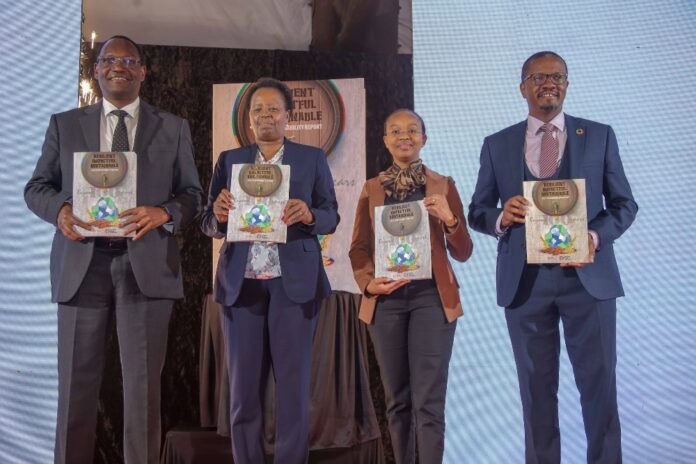East African Breweries PLC (EABL) will reduce its carbon emissions by 95 percent annually as a result of Ksh. 5.1 billion renewable energy investments in its plants in Kenya and Uganda, the company has reported.
The investment in biomass plants will replace heavy fuel oils used at the company’s sites in Ruaraka, Kisumu in Kenya, and Port Bell in Kampala and will be powered by sustainable raw materials such as macadamia shells, coffee, rice husks, and sugarcane bagasse. The shift will cut its carbon emissions by 42,000 tonnes per year.
The company has outlined the projections in its EABL 2022 Sustainability Report, launched today by the Principal Secretary, of the Ministry of Environment and Forestry, Dr. Chris Kiptoo.
He stated that the Environment and Forestry ministry will be facilitating enabling policies and strengthening strategic partnerships that will support sustainability efforts by the private sector.
“The Ministry of Environment and Forestry is committed to promoting and facilitating good governance in the protection, restoration, conservation, development, and management of environment and forestry resources, for equitable and sustainable development. It is encouraging to see companies such as EABL embracing sustainability and integrating the UN Sustainable Development Goals (SDGs) in its operations. The level of environmental investment is significant, especially the new biomass boilers, which will considerably reduce its carbon emissions,” he said.
The 2022 Sustainability report provides an overview of the processes and mechanisms the company has put in place to support our commitment to doing business the right way. It highlights the impact of its sustainability work on various stakeholders and communities.
EABL to construct Kes.1 billion Micro-breweries at Ruaraka, Nairobi
Speaking at the launch, EABL Group Managing Director and CEO, Ms. Jane Karuku, noted that addressing climate change was a top priority for the company as EABL seeks to substantially increase its share of renewable energy use in the global energy mix.
“Every other day, another research finding, news story, or environmental-related disaster comes with more evidence that our planet is in a crisis. Despite these seemingly insurmountable challenges, EABL is taking the lead in developing solutions. The biomass investment demonstrates the strength of our commitment to pioneering ‘Grain to Glass Sustainability’, which is a key pillar of our Sustainability Strategy, and continues our work to provide sustainable solutions for local supply chains. It will create over 900 direct and indirect green jobs throughout our supply chain, particularly with local farmers, who we have contracted to provide the raw materials,” said Ms. Karuku.
Africa accounts for only 2-3 percent of the world’s carbon emissions from energy and industrial resources. However, East Africa remains highly vulnerable to the impact of climate change: according to the latest Intergovernmental Panel on Climate Change (IPCC) Report, the region is already experiencing warming of 1-1.5 degrees centigrade above pre-industrial times.
To champion health literacy and tackle alcohol harm, EABL launched the SMASHED program to educate young people, parents, and teachers on the dangers of underage drinking, reaching 35,500 people and achieving a success rate of 137 percent, which is a reach of 48,690 people.
Gionee M6 Lite – The World safest Android Smartphone
In an aim to champion inclusion and diversity, EABL reached 5,327 people through business and hospitality skills training programs, a 165 percent achievement of its target of reaching 3,220 people. The manufacturer also increased the number of women represented in its community programs, from 54 percent in 2021, to 63 percent in 2022.
Towards its goal to preserve water for life, EABL completed 100% of its water collective action projects, reaching a total of 99,317 people with WASH (water, sanitation, and hygiene) programs, 311 percent above its annual target to reach 31,885 people.
EABL targets to become Net Zero in its direct operations by 2030. To this end, its sites run on 96.9 percent renewable electricity for its operations, above its target of 95 percent.
Aligned with its agenda of transitioning to a circular economy model, EABL has maintained zero tonnes of waste to landfill from its direct operations. Additionally, 100 percent of all plastics used at EABL’s sites are widely recyclable, reusable, and compostable, which is higher than in 2021, where 90 percent of its plastics were widely recyclable. It is also higher than its 2022 target of 98 percent.
EABL is deliberately driving a shared prosperity agenda to guarantee value for employees, consumers, and business partners, including distributors and retailers. As the next 100 years of the business unfold, EABL’s efforts towards the environment, inclusivity, diversity, and promoting positive drinking, guided by its 10-year Sustainability Strategy: Society 2030, will continue in earnest.








